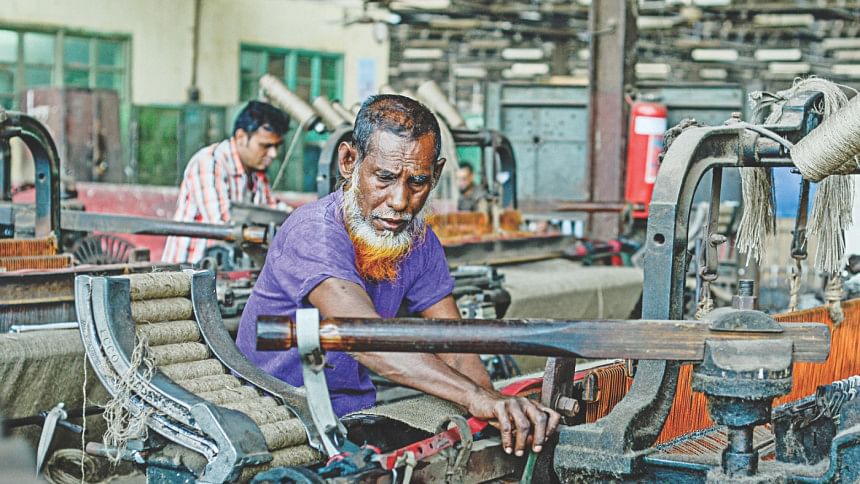Jute mill workers suspend hunger strike for 3 days

Workers of nine state-run jute mills in Khulna-Jashore industrial belt have suspended their indefinite hunger strike for three days, following a meeting with State Minister for Labour and Employment Munnujan Sufian early yesterday.
At the meeting, Jute Mill Collective Bargaining Association (CBA) and Non-CBA leaders agreed to withhold the agitation to mark Martyred Intellectuals’ Day (Saturday) and Victory Day (Monday).
Workers also joined work after four days. Around 2:30pm yesterday, this correspondent saw some workers of Platinum Jute Mill busy working at the mill.
However, the big tents erected near mill gates on BIDC road in Khalishpur, where hundreds of them took shelter with pillows and blankets, were still there. Though road communications remained halted, almost all the shops opened for business.
“We’ll resume our hunger strike if the government fails to realise our demands,” said Touhid Sheikh, a worker of Platinum Jute Mill, yesterday.
“The government has already implemented the wage board for six sectors, including sugar and fertiliser, but it’s yet to implement a wage commission for us,” he added.
Murad Hossain, former president of Crescent Jute Mill and joint convener of CBA and Non-CBA Sangram Parishad, said the state minister told workers that the prime minister has assured that the government will implement the national wage commission for them.
The state minister also said she will personally discuss the matter with the premier, he added.
Thousands of workers started the indefinite hunger strike from December 10 to press home their 11-point demand.
Their demands include payment of regular wages, cancellation of public-private ownership, necessary fund for jute sector, insurance for families of deceased workers, provident fund and gratuity facility for retired workers and regularisation of temporary workers, said Shahana Sarmin, president of Platinum Jute Mill Employees Union.
She said an inter-ministerial meeting will be held at the textile and jute ministry around 11am today to discuss implementation of the commission while the government will hold another meeting with workers’ leaders at Bangladesh Jute Mills Corporation around 3pm.
“The government needs around Tk 1,103 crore to implement the wage commission,” she added.
At least one jute mill worker died and around 200 were admitted to different hospitals and clinics in Khulna as of yesterday.
Boniz Uddin Miah, liaison officer of BJMC, said workers went back to work in the morning. Their presence will increase eventually, he hoped.
Around 31,000 people have been working in the nine jute mills in the region.
The Khulna-Jashore industrial belt, producing 86.39 metric tonnes of jute products every day, produced nothing in the last four days as the workers remained on work abstention.

 For all latest news, follow The Daily Star's Google News channel.
For all latest news, follow The Daily Star's Google News channel. 



Comments